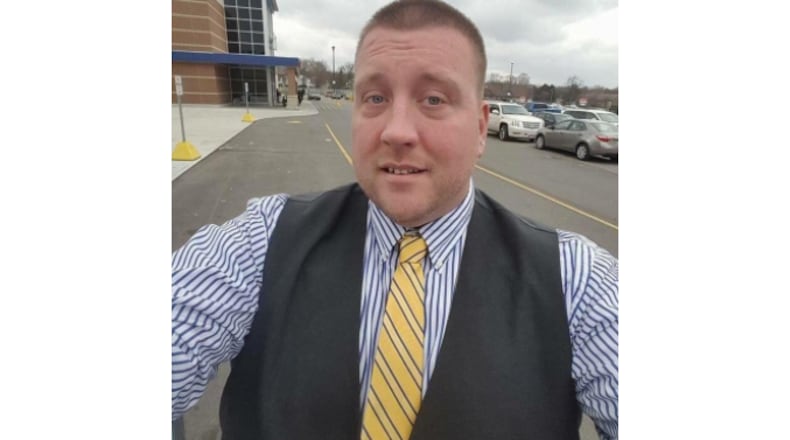“Basically, it was a loss of everything,” Childress said. “Living skills reduced to the animal level.”
MORE: Clark County suspected overdose deaths surpass last year’s total
Childress has been clean since Feb. 19, 2014. He now owns an exterior cleaning and restoration business where he has washed homes worth more than $1 million.
When he was in active addiction, Childress didn’t care if he lived or died because he said he had nothing to live for. He wanted to stop using but he didn’t know how to get clean or stay clean.
“I couldn’t even grasp it,” he said. “I got clean because the consequences were very painful. I can’t use without going to jail or prison. I got sick of going to jail.”
Childress, who lives in Dayton but attends meetings weekly in Springfield, lives by a simple motto: Don’t use, no matter what. That goes for all drugs, including alcohol.
“My cup is just overflowing,” Childress said.
Dope fiend on a bicycle
The marijuana took away much of what Childress dreamed of being as a teenager, including playing football. He never finished high school. It led to trying any drug he “could get his hands on,” Childress said.
“Heroin, crack, anything,” he said. “I always tried to substitute one for another. Basically I tried to use anything in trying to find out that I could use successful and I couldn’t. Using always brought me to my knees.”
Childress tried to stop multiple times; he went to detox three times and attended four different rehabilitation centers. He tried religion and even moved away but he said it couldn’t eliminate his desire to use drugs.
“I had settled for being a dope fiend on a bicycle,” Childress said.
He eventually landed in prison for 18 months for aggravated robbery and then again for six months for forgery. While in jail, he told himself he was never going to pick up drugs again — but he used the day he got out.
RELATED: $213K grant to open safe house for Clark County addicts
In 2014, Childress finally got clean. He attended McKinley Hall, which he said was the first thing he had ever completed in his entire life.
He later began working a 12-step program where he participates in nearly every activity — sponsorship, meetings and service work. Most importantly, he found role models who had lived a clean lifestyle for many years.
“I needed somebody’s actual experience with living clean,” Childress said. “All of my friends are in recovery.”
He lived in a clean living facility for a nearly a year after getting clean, he said. It was there where he had to be taught how to live, he said, including small tasks such as making his bed, paying bills and simply showing up on time.
“Showing up has been the single most important thing I’ve ever had to do and I didn’t know how to do that,” Childress said.
A new way to live
The hardest part of living clean has been learning to enjoy life without the use of drugs, he said.
“Recovery has given me a complete personality change and that’s what I needed,” Childress said.
As he began living a clean lifestyle, other family members followed. Within a year-and-a-half, Childress had his own place and a car, which he hadn’t had for more than 10 years.
His brother saw that and wanted it, he said. He’s been clean for two years.
However, Childress’ sister, Pamela, wasn’t able to remove herself from the clutches of addiction, he said. She died of an apparent overdose on July 28. The dealers who sold her drugs were later arrested.
SOCIAL MEDIA: FOLLOW REPORTER MICHAEL COOPER ON FACEBOOK AND TWITTER.
“It’s been the hardest thing I’ve had to live through sober,” Childress said.
His sister tried treatment several times but it never stuck, he said.
“Her desire to use was still really strong,” Childress said.
In his experience, treatment and recovery are two vastly different things, Childress said.
“I could go to treatment a thousand times but that’s still not enough time for me to find a new way to live,” he said. “It’s something I’m still working on to this day. It’s not enough time for me to find a new way to live. There’s no easy fix for this. It’s a whole new way of life.”
MORE: Drug epidemic wreaking havoc on Clark County businesses, economy
More than three years later, Childress still has dreams about using, he said, including dying. Dozens and dozens of people Childress knows have died from drug addiction, he said. At the same time, he knows hundreds of people who have recovered.
“Recovery is possible,” Childress said.
Childress is expecting his first child, a daughter, later this year.
“I’m grateful she gets to be born and never gets to see that,” he said. “The hope is that she never has to.”
3 QUICK NEWS-SUN READS
Clark County schools make changes due to drug crisis, 1 stocks Narcan
Clark County leaders glad to hear Trump call drug crisis an emergency
Drug crisis traumatizing children in Clark County, state
SPRINGFIELD’S OPIOID WAR
ABOUT THIS SERIES
The Springfield News-Sun has written extensively about opioid and heroin problems in Clark County in the past five years, including stories about multiple overdoses in one weekend and efforts to expand treatment options. This year, the News-Sun will take a deep dive into the community’s drug epidemic and what local leaders are doing to solve the problem.
About the Author

